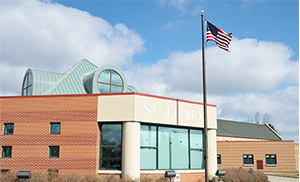Posted on August 26, 2013 by Matheny
 By Gary E. Eddey, MD
By Gary E. Eddey, MD
Vice President for Medical Affairs and Chief Medical Officer
The most important aspect of the care of Lesch-Nyhan patients from both the practitioner and health system perspectives is collaboration with the parents and/or patient. A close second is the ability of the healthcare provider to demonstrate adaptability of the system and individuals involved when confronted with new challenges.
Lesch-Nyhan is a rare X-linked, recessive genetic disorder associated with cognitive impairment, hyperuricemia, renal involvement and the hallmark symptom, severe self-injurious behaviors. There are endless behavioral issues that have to be addressed when caring for a Lesch-Nyhan patient. Among them:
- Safety issues relating to transportation.
- Equipment issues relating to wheelchair seating systems.
- Availability of transition care.
For these issues and many more, it is important for a healthcare institution to recognize the necessity of crossing departmental and institutional lines. It is also important that healthcare providers be able to collaborate with parents and other relatives of LND patients.
Third in a series of four articles on Lesch-Nyhan Disease. For more information, feel free to call Gary E. Eddey, MD, at 908 234-0011, ext. 737.
Posted on August 16, 2013 by Matheny

Dr. Gary E. Eddey.
By Gary E. Eddey, MD
Vice President for Medical Affairs and Chief Medical Officer
Protective devices are, at times, controversial, but they are essential to use for individuals with Lesch-Nyhan disease.
Professionals who are unfamiliar with LND may perceive the use of these protective devices as a form of restraint. But when protective devices are requested by the patient and used to safeguard the patient from him or herself, the outcome is an extraordinary feeling of comfort and safety. Not allowing the patients to use protective devices, in fact, would violate their autonomous rights.
Individuals with LND appear at times to be very high functioning in an intellectual way, although they are limited in some aspects of their cognition. Their self-injurious behavior goes against what they want to do. So, the behaviors they exhibit to parents, caregivers and to themselves can be very difficult to understand. Caregivers need continuing support on how to best cope with and care for those individuals in order to promote the positive aspects of the person. As mentioned previously, treatment of individuals with LND should include use of a behavioral technique commonly referred to as selective ignoring, with redirection of activities.
Second in a series of four articles on Lesch-Nyhan Disease. For information, feel free to call Dr. Eddey at 908 234-0011, ext. 737.
Posted on August 9, 2013 by Matheny

Dr. Gary E. Eddey
By Gary E. Eddey, MD, Vice President for Medical Affairs and Chief Medical Officer
Matheny has been providing residential programs for individuals with Lesch-Nyhan Disease for more than four decades, and currently five young men and one young woman are under Matheny’s care.
Lesch-Nyhan is a rare X-linked, recessive genetic disorder associated with cognitive impairment, hyperuricemia, renal involvement and the hallmark symptom – severe self-injurious behaviors. LND is usually diagnosed in the first few months of life as a developmental delay and may be diagnosed initially as cerebral palsy. The behavioral aspects of Lesch-Nyhan, such a self-mutilation and aggressive behavior, are involuntary and not under the patient’s control. These behaviors usually begin between the ages of three and six months and often escalate as the patient ages and becomes more physically able to cause self-injury.
Treatment for LND patients should include:
• Judicious use of protective devices.
• Utilization of a behavioral technique commonly referred to as selective ignoring, with redirection of activities.
• Occasional use of medications.
The behavioral strategy that Matheny has long employed is one of selective ignoring and distraction. We have an interdisciplinary team of people who have multiple years of hands-on experience working with people with LND, and we constantly re-educate all staff in order to maintain the most consistent continuity of care around that model.
This is the first in a series of four articles on Lesch-Nyhan Disease.
Posted on April 15, 2013 by Matheny

Dr. Gary E. Eddey.
What impact will Matheny’s habilitation model have on care for persons with medically complex developmental disabilities in New Jersey? It ensures continuation of the following:
• Seamless collaboration of an interdisciplinary and/or transdisciplinary team.
• An environment that accommodates all medical and therapeutic needs while providing a maximum level of social interaction that includes educational and recreational activities and frequent community engagement.
• Conservation of public health dollars by providing a continuum of health care services that minimize expensive, unplanned acute care services and hospital readmissions.
• Assurance that healthcare students in a broad range of disciplines will receive training that instills recognition of the need to accommodate this challenging population. It also helps these students be more comfortable and competent in doing so.
(The last in a series of articles by Gary E. Eddey, MD, Vice President and Chief Medical Officer at Matheny, on the habilitative healthcare model.)
 By Gary E. Eddey, MD
By Gary E. Eddey, MD


